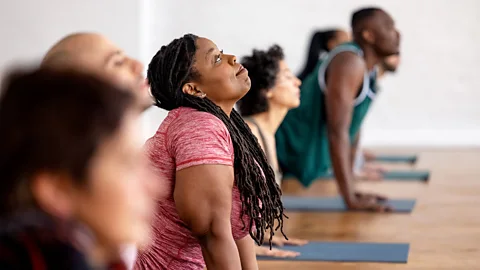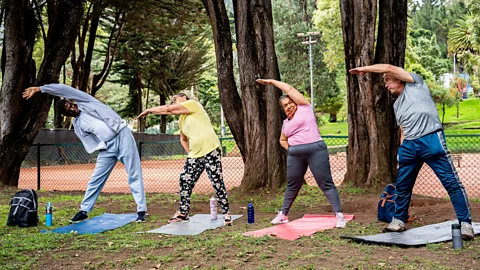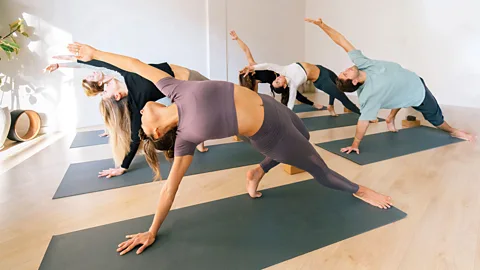The mind-altering power of yoga could improve your mental health
 Getty Images
Getty ImagesYoga has been found to increase grey matter and alter key networks in the brain. Now there are hopes it could be used to help improve people's mental health.
My right arm is shaking. Sweat drips from my forehead as I twist my body from a side plank into a yoga pose known as "Wild Thing" – or "Camatkarasana". It is quite the contortion – I arch my back, stretching my left arm over my head. My right foot is planted on the ground, and I look up to the sky.
One translation of the Sanskrit word camatkarasana is "the ecstatic unfolding of the enraptured heart" and is said to elicit confidence. And – despite the strain – I feel invincible.
When I started practicing yoga, I wanted to sweat and to build strength. I saw it purely as a form of exercise – but I found it was so much more.
The practice of yoga dates back over 2,000 years to ancient India. And though today, there are many different types of yoga – from meditative yin yoga to flowing vinyasa – through their use of movement, meditation and breathing exercises, all forms focus on a mind-body connection. And there is growing evidence that yoga may not just have physical benefits but may also be good for your mind too. Some researchers even hope it could be a promising way of helping people with post traumatic stress disorder (PTSD) cope with their symptoms.
Certainly, research on the physical benefits of yoga is extensive. The first thing anyone who hasn't tried yoga should know is that it can be surprisingly strenuous. It improves strength, flexibility and cardio-respiratory fitness. Studies have found yoga can improve stamina and agility. It can prevent injuries (although it can also be a cause of injuries if not done correctly) and enhance performance in other sports – with advocates including world-class footballers, American footballers and basketball players.
And there is a growing body of research showing yoga can be beneficial for a wide range of health issues.
In epilepsy sufferers, for example, practicing yoga has been seen to significantly reduce the number of seizures – or even prevent them entirely. Yoga has been used as an intervention to help manage type 2 diabetes, reduce chronic pain, and aid in stroke rehabilitation. It has also been shown to be more effective than physiotherapy at improving the quality of life for people with multiple sclerosis, and one trial even suggests it could be beneficial for cancer survivors.
 Getty Images
Getty ImagesYoga can also help you live a healthy life for longer, says Claudia Metzler-Baddeley, a cognitive neuroscientist at the Cardiff University Brain Research Imaging Centre (Cubric) in the UK.
But yoga has also been found to change the makeup of your brain. Studies show practicing yoga positively impacts both the structure and function of parts of the brain including the hippocampus, amygdala, prefrontal cortex, cingulate cortex and brain networks including the default mode network, part of the brain involved in introspection and self-directed thought. Some researchers say this could mean it has potential to mitigate age-related and neurodegenerative declinesfthere.
Metzler-Baddeley's research focuses on the cognitive and neural mechanisms of ageing and neurodegeneration. "We think inflammation accelerates ageing – which can be caused by chronic stress," she says. "Stress hormones like cortisol cause inflammation, which can cause increased blood pressure. These are, of course, risk factors for unhealthy ageing."
Meditation and mindfulness, she adds, are integral to yoga practice, and "seem to induce changes in brain networks which are important for metacognition, meta-awareness, and regulating emotional responses to stress".
"We know there's potential [for yoga to] keep us healthy as we age," she says. "There are studies that have found a number of structural differences [in the brains of people who practice yoga], and that certain areas important for metacognition and problem solving seem to be larger."
Neuroimaging has revealed yoga can lead to an increase in the volume of grey matter in the brain. Grey matter – or the cerebral cortex – is important for mental processes including language, memory, learning and decision-making. In Alzheimer's disease, there is a loss of grey matter volume and one 2023 study found yoga could slow memory loss among women at risk of the disease.
All exercise is known to boost your mood by lowering levels of stress hormones and increasing the production of endorphins – often referred to as the "feel-good chemicals". But the combined postures, breathing and meditative exercises in yoga may have additional benefits, reducing anxiety, stress, depression and improving overall mental health. Studies have shown that yoga can improve the short-term symptoms of depression, for example.
"I didn't want to go on. Life was too difficult," says Heather Mason, founder of yoga therapy training school The Minded Institute. "Yoga transformed my life – helping me manage depression, anxiety and PTSD."
 Alamy
AlamyAfter experiencing the profound effects of yoga, Mason went on to train in yoga, psychotherapy and neuroscience, before founding her yoga therapy training school in 2009. "I felt there were a lot of claims [about yoga] that were made that had no substantiated evidence. And when you have been hopeless for most of your life, you don't want to be peddled something that might work," she says.
Mason now trains health and yoga professionals in yoga therapy. "I realised that there was an accessibility problem," she says. "[Yoga] is marketed is for young, white, skinny women. If you don't see yourself reflected within this practice, you may not think it's for you."
It can be expensive, too, she adds, "This is why I am so dead set on its integration into the NHS [the UK's National Health System]." Plus, people with mental health issues can often struggle to engage in self-care, she explains. "They have to be motivated to do it. I thought, if we can bring it into the medical paradigm – all that will change."
Six Steps to Calm Newsletter
Discover a calmer future with this course of six science-backed techniques, delivered weekly to your inbox. window._taboola = window._taboola || []; _taboola.push({ mode: 'alternating-thumbnails-a', container: 'taboola-below-article', placement: 'Below Article', target_type: 'mix' });
